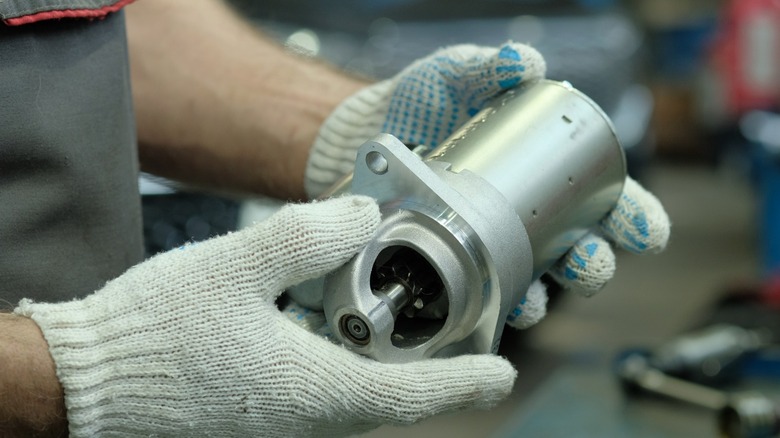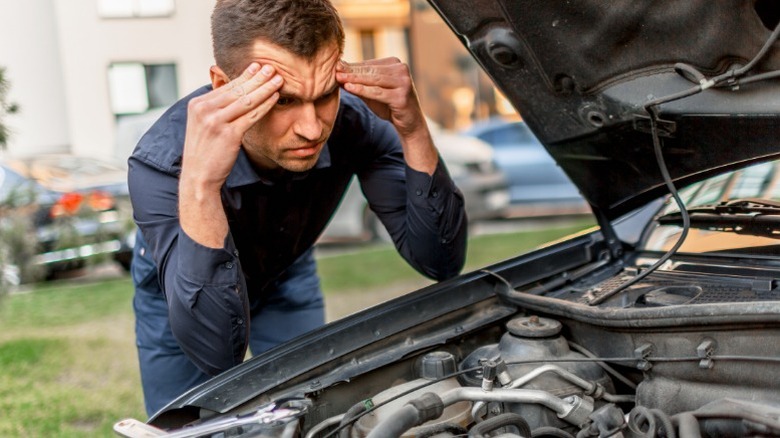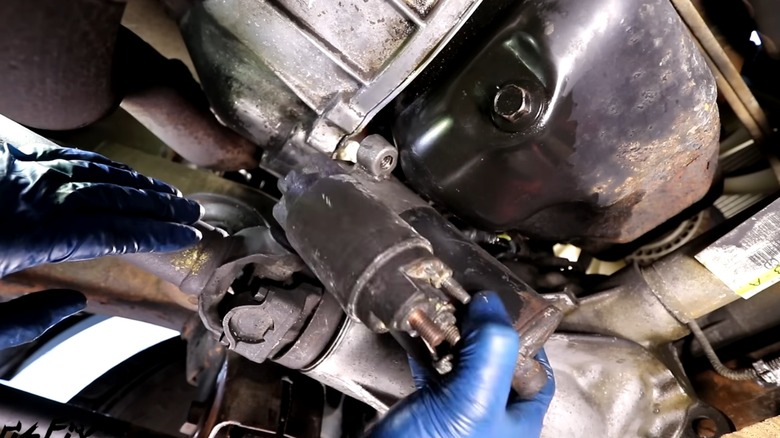If You Hear This Sound, It May Be A Sign That Your Car's Starter Is Bad
For the most part, modern cars are incredibly durable and reliable. If you avoid bad habits, most mainstream vehicles are easily capable of reaching 100,000 miles. However, despite how robust contemporary cars are, they can still develop wear and tear with age or mechanical malfunctions. The good thing is that cars have many ways of letting us know when something is wrong. Not only do manufacturers build modern vehicles with onboard diagnostics (OBD) systems to monitor critical components and trigger a check engine light when they detect an error, but our cars can also make various sounds when there's a problem.
Recognizing your vehicle's signs of trouble is a valuable way to identify issues, and it may even save you some money on diagnostic work. One sound, in particular, that can be useful when trying to figure out why your car won't start is a grinding noise. This sound usually indicates a problem with the car's starter motor, which is used to help get the vehicle running and the engine firing. The starter or starter motor connects to your car's ignition system and the engine's flywheel. When you turn the ignition key, an electrical signal is sent to the starter, allowing it to engage the flywheel and crank the engine.
However, over time and due to mechanical failures, the gears and electrical components in the starter can wear down. When this occurs, you may hear an obnoxious grinding or whirring sound as you attempt to start the vehicle, and it may progress to the point where you can't start the car at all. If you're curious about learning more about signs of starter trouble, as well as the potential costs for a repair, stick around. Here's what you need to know.
What are some other signs of a bad car starter?
While an obnoxious grinding or whirring sound when starting the engine is one of the most characteristic signs of a bad starter motor, it's not the only symptom that you may experience if this component fails. It's also worth noting that a few different parts can fail and prevent your vehicle from starting. Understanding the different symptoms that these components can create when they malfunction can be an excellent way to narrow down the source of the problem and prevent unnecessary diagnostic work and expenses.
If your car's starter motor is bad, it's likely to present a couple of symptoms in addition to or instead of a grinding noise, depending on the type of damage. If you notice that your vehicle's dashboard lights, headlights, and radio all seem to work normally, but the engine won't start, there's a good chance the starter is to blame. This usually indicates that the battery has juice, which is why the lights and radio work, but that the starter is damaged and unable to crank the engine.
In addition to grinding sounds, another sign of starter trouble can be a clicking noise. Clicking sounds are often associated with starter trouble, but they can also point to other electrical issues, so you may not want to replace your starter based solely on a clicking sound and an inability to start the car. Other potential signs of a bad starter can include things like smoke in the engine bay, which may indicate an electrical malfunction, and an oil buildup on the starter, which can cause it to fail and may also point to a greater oil leak problem.
How much does it cost to replace a car starter, and can you DIY the repair?
Car starters are durable components and generally last for at least 100,000 to 150,000 miles. However, like all automotive parts, they're subject to wear and tear over time and can experience failure due to age and damage. If your starter fails, you don't have much choice but to replace it. Depending on your car's make and model and the labor rates in your area, a starter motor replacement can cost anywhere from a couple hundred bucks to upwards of $600. A replacement starter can cost as little as $50 for a rebuilt unit to over $500 for a new OEM model. If you pay for a professional to perform the replacement for you, you'll also have to factor in the mechanic's labor. Depending on the vehicle, that may translate to anywhere from an hour to several hours of additional time at whatever rate the shop charges.
Considering the costs associated with replacing the starter and how essential the starter itself is for your vehicle, you may be wondering if the replacement is something you can do yourself. The good news is that yes, you can DIY a starter motor replacement, even with relatively little automotive experience. While some cars' starters are located in hard-to-reach areas and require substantial disassembly to access, most vehicles have their starters positioned in relatively easy-to-access areas. Removing and replacing a starter is usually as simple as disconnecting a few bolts and some electrical connections, and then following the same steps backward with a new unit. As mentioned, though, the starters on some cars are very difficult to access, so you may want to invest in a vehicle repair manual before attempting to tackle this job yourself, especially if you're an automotive novice.


